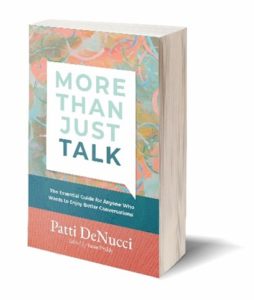Need some inspiration on how to get good conversations going – and keep them going? Tired of dull, drab exchanges that go nowhere, are unbalanced or a waste of time, or drift into zones of extreme unpleasantness? (So draining!) Here are a few basic tips that can help.
- Determine what “good conversation” is for you. You can’t hit a target if you don’t know what it looks, sounds, or feels like. Or if it’s shrouded in fog. Now’s the time to get some clarity! How would you describe a worthwhile exchange? What topics do you enjoy discussing? Think of good conversation experiences you’ve had in the past. Who were they with? What was the setting and situation? What did you talk about? What did everyone involved do to make it so enjoyable? Keep a journal or some notes on what worked. It could be a total game-changer.

- Set your intentions. Ahem. You may not want to hear this, but if you’re not enjoying your conversations, you are partially responsible. What do you intend to do to improve things? What attitudes do you intend to adopt? What actions and changes do you intend make? Grab a piece of paper and finish this sentence “I intend to…” in as many ways as you can think of. Writing it all down is extremely powerful.
- Collect and try out good opening lines. These could be questions, comments, or even tasteful compliments. (For a plethora of conversation-generating ideas, look no further than the free PDF of the Appendix from my award-winning better conversation guide More Than Just Talk. Grab yours here.)
- Assume positive rapport. Huh?? In simple terms, this means you should assume that, darn it, other people will like you. In contrast, being all up in your own head or overly self-conscious, hesitant, shy, or worried about the impression you are making will likely hurt your chances of having a pleasant interaction. Why? Because these make other people uncomfortable.
- Collect and try out conversation deepeners, expanders, shifters, and closers. Deepeners help you stay focused on a single topic. (“Tell me more about that…” is one of my favorites.) Expanders help you explore many topics. Shifters help you manage or change the topic, mood, or tone of a conversation. And closers are your ticket to saying a gracious, but decisive “bah-bye” when you’re ready to move on. (“Please forgive me, I have to…” is a classic gotta-go tactic.)
- Do a post-conversation review of how things went. Ask yourself what worked and…not so much? How did it feel? What would do you have done differently? And finally…
- Keep at it. Like anything else, being a good conversationalist takes practice, persistence, and patience. Does it take effort? Oh yes. Worth it? Absolutely!
Dive deeper into these how-to’s and tips. Grab a copy of my new award-winning book More Than Just Talk: The Essential Guide for Anyone Who Wants to Enjoy Better Conversations. And consider purchasing copies for anyone in your life who could use a little guidance and encouragement in the conversation department. Family members? Friends? Your team at work?
Check out what one reviewer (who I swear I don’t even know!) wrote on Amazon recently: “More Than Just Talk lives up to its title. This truly is a comprehensive guide to the benefits, uses, and strategies to develop excellent conversations. Whether you’re interested in advancing your career, deepening personal relationships, or improving your health, Patti DeNucci addresses it all. Her information is well researched and cited while being presented in a companionable tone that is fun to read.”



I can’t wait to try out some new conversation starters at our block party tonight. Thanks, Patti, for such gracious suggestions. Buying the book now.
Hi Julie! And thanks for your kind comment. Being the writer / communicator you are, you might enjoy having a “signature question” that you ask everyone you converse with at the party. “So, what books are on your nightstand / in your reading queue?” “What did you during summers as a kid?” “What’s your go-to cocktail or beverage for summer?” Or this one that someone posed to me: “Tell me about your grandparents…” Sounds weird, but we exchanged grandparent stories and learned a lot about each other’s heritage and background. Have a great time!
I have been handing out copies of your first book to my mentees for years, and it looks like I will up that gift to two now!
Great and usable advice and one of my favorite things you say is, “Assume positive rapport.” It’s such a simple piece of advice, and you are right, it will make a huge difference!
Thanks for all of your insights and support in this very important skill set.
Thank you so much, Kali’! I so appreciate you being such an advocate.